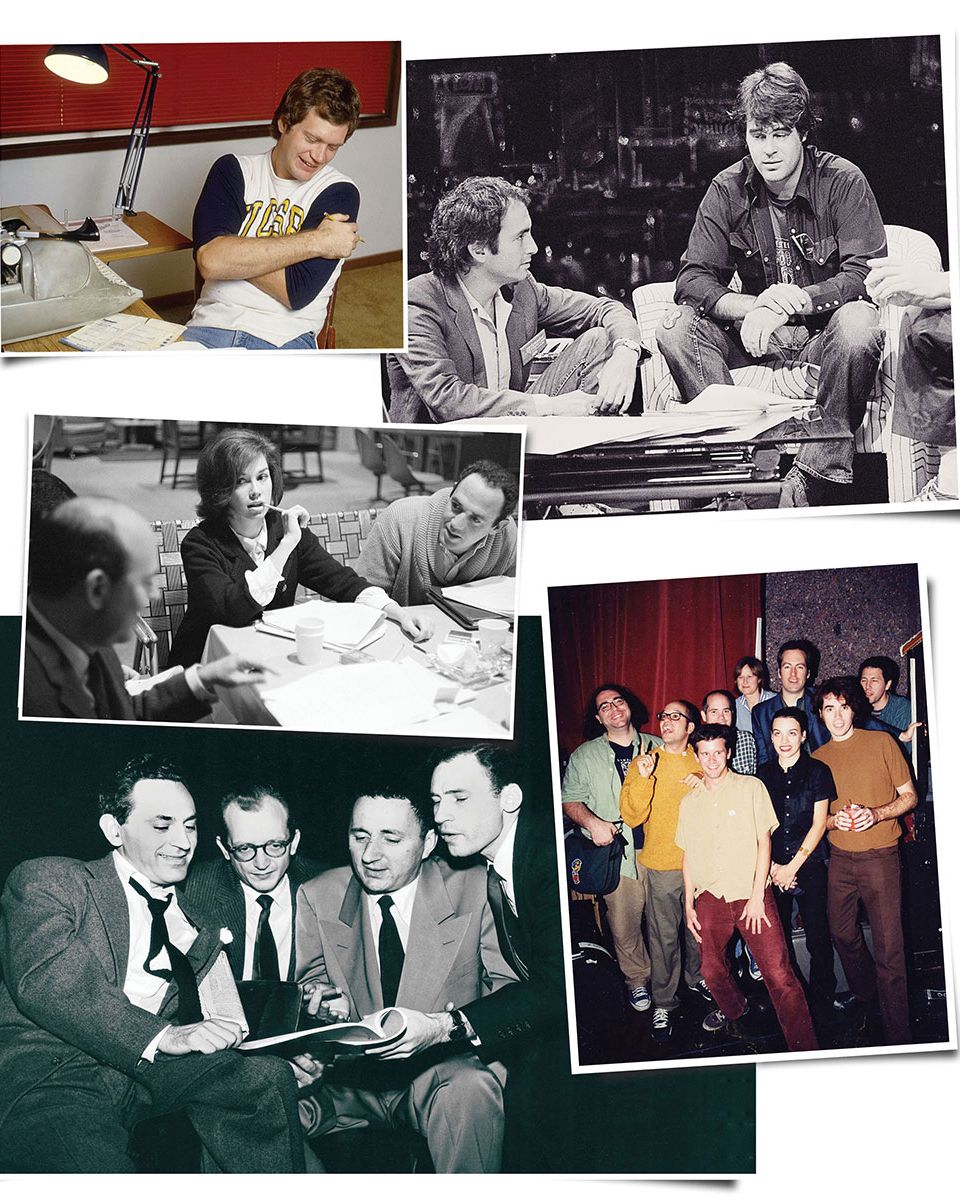A comedy series is only as funny as its script. You can have a talented cast and a keen director, but if the jokes aren’t there, it won’t matter. That’s what separates the bad sitcoms from the good ones, and the good sitcoms from the classics. Below, we’ve rounded up some of the most impressive writers rooms in televised comedy history dating back to the 1950s. It’s an updated list of an old post, where we wrote at the time, “Either by design or by luck, some of the best comedy shows ever have featured an eclectic, unusual mix of personalities behind the scenes. This is a list of some of the most remarkable groups of writers in the history of TV comedy, not the best-written shows.” We’ve updated the old entries and added new ones, only including shows that aren’t on the air anymore (with two long-running, notable exceptions). We also, when possible, highlighted the strongest season of the series and the writers who made it great. (Note: Although women and POC representation in the writers room has improved in recent years, television still has a long way to go when it comes to shedding its boys’ club roots, which you will see reflected everywhere in this list.)
Your Show of Shows (NBC, 1950–1954)
Staff: Mel Brooks (Blazing Saddles); Carl Reiner (The 2000 Year Old Man); Neil Simon (The Odd Couple); Danny Simon (Caesar’s Hour); and Mel Tolkin (All in the Family)
Head writer Mel Tolkin presided over the most prestigious comedy writing staff in TV history, and one that the show’s members couldn’t stop writing about for years to come. Playwright Neil Simon wrote Laughter on the 23rd Floor about his experiences here; Carl Reiner used his time on Your Show of Shows as the basis for The Dick Van Dyke Show; and Mel Brooks produced My Favorite Year, which was inspired by his stints on this show and its successor, Caesar’s Hour. The staff also included Danny Simon, who inspired The Odd Couple and is also credited with teaching his brother, Neil Simon, and Woody Allen how to write comedy. It’s a common misconception that Allen and M*A*S*H creator Larry Gelbart were also on staff at Your Show of Shows, but Gelbart only joined the group for Caesar’s Hour, while Allen came onboard later to write on Sid Caesar’s TV specials that followed that series.
The Dick Van Dyke Show (CBS, 1961–1966)
Staff: Jerry Belson (Gomer Pyle U.S.M.C.); Sam Denoff (That Girl); Sheldon Keller (Caesar’s Hour); Carl Kleinschmitt (The Odd Couple); Garry Marshall (Happy Days); Dale McRaven (Perfect Strangers); Howard Merrill (F Troop); Bill Persky (That Girl); Carl Reiner (The 2000 Year Old Man); and John Whedon (The Donna Reed Show)
The Dick Van Dyke Show was about the head writer of a comedy show, so it’s only fitting that the real-life staff would be so star-studded, or at least become stars in the near future. The two biggest names are, of course, Garry Marshall, who created Happy Days and adapted The Odd Couple for TV, and nine-time Emmy Award–winning creator Carl Reiner, who directed Steve Martin in The Jerk and All of Me. But there’s also John Whedon, writer for The Donna Reed Show (and grandfather of nerd icon Joss); the creators of That Girl, Sam Denoff and Bill Persky; Perfect Strangers creator Dale McRaven; and Martin Ragaway, who also wrote for The Red Skelton Show, working alongside Sherwood Schwartz. Over five seasons (and hundreds of still-impressive physical-comedy gags), The Dick Van Dyke Show won 15 Emmys, including the Outstanding Writing Achievement in Comedy award from 1962 to 1964.
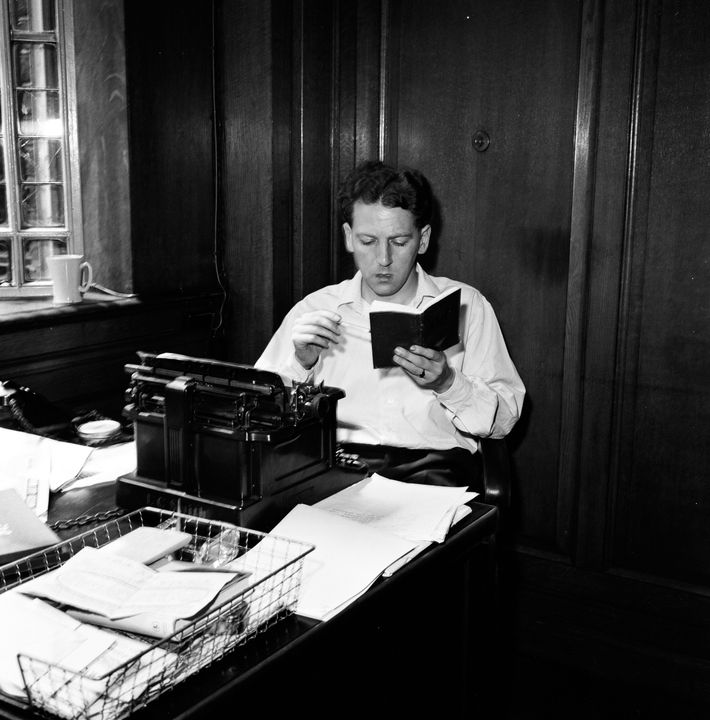
The Frost Report (BBC, 1966–1967)
Staff: Tim Brooke-Taylor and Bill Oddie (The Goodies); Graham Chapman, John Cleese, Eric Idle, Terry Jones, and Michael Palin (Monty Python); Barry Cryer (The Two Ronnies); Marty Feldman (Young Frankenstein); James Gilbert (The Two Ronnies); Willis Hall and Keith Waterhouse (Billy Liar); Antony Jay (Yes Minister); John Law (Marty); Frank Muir and Denis Norden (Take It From Here); David Nobbs (Reggie Perrin); Peter Tinniswood (That Was the Week That Was); and Dick Vosburgh (The Two Ronnies)
Following in the footsteps of David Frost’s previous series That Was the Week That Was, The Frost Report was an equally influential satirical show that saw Frost rehiring a lot of the talent from TW3 and bringing in some new blood as well. Most notable is the presence of a pre–Monty Python John Cleese, Michael Palin, Terry Jones, Eric Idle, and Graham Chapman (a.k.a. Python sans Gilliam), who learned to write together here. Also among the Pythons were columnist-playwright-novelist Keith Waterhouse; Mel Brooks regular Marty Feldman; Tim Brooke-Taylor and Bill Oddie of The Goodies fame; longtime comedy partners Frank Muir and Denis Norden; Antony Jay, co-creator of Yes Minister and Yes Prime Minister; and a lot of guys who went on to work on The Two Ronnies (Ronnie Barker and Ronnie Corbett first appeared together in the cast of The Frost Report).
The Smothers Brothers Comedy Hour (CBS, 1967–1969)
Staff: Allan Blye (The Sonny and Cher Comedy Hour); Ernest Chambers (The Dick Van Dyke Show); Ron Clark (Silent Movie); Bob Einstein (Curb Your Enthusiasm); Gene Farmer (Rowan and Martin’s Laugh-In); Hal Goldman (The Jack Benny Program); Al Gordon (Three’s Company); Steve Martin (The Jerk); Lorenzo Music (The Bob Newhart Show); Rob Reiner (All in the Family); and Mason Williams (Saturday Night Live)
The Comedy Hour began as a relatively tame variety show, but it quickly became required watching, due partially to the musical guests (the Who, Cream, Buffalo Springfield) but also to the “hip” comedy writers who were penning topical and satirical jokes that other programs at the time wouldn’t touch. Steve Martin is the most well-known name, but the behind-the-scenes team also included Bob “Super Dave” Einstein (Marty Funkhouser on Curb Your Enthusiasm); Pat Paulsen (the Smothers Brothers convinced him to run for president six times, once with the slogan “I’ve upped my standards. Now, up yours”); “Classical Gas” composer Mason Williams; and Rob Reiner, the All in the Family–starring, This Is Spinal Tap–directing son of Carl. And let’s not forget Ron Clark, who penned Silent Movie and High Anxiety with Mel Brooks, and Lorenzo Music, the creator of The Bob Newhart Show and the pre–Bill Murray voice of Garfield the Cat.
Monty Python’s Flying Circus (BBC, 1969–1974)
Staff: Graham Chapman (Monty Python and the Holy Grail); John Cleese (Fawlty Towers); Terry Gilliam (Brazil); Eric Idle (All You Need Is Cash); Neil Innes (The Innes Book of Records); Terry Jones (Labyrinth); and Michael Palin (Life of Brian)
Even though the Flying Circus writing staff was mostly made up of just six members, it’s an impressive group of comedic minds nonetheless. With contributions from Neil Innes, the Seventh Python, the whole was definitely greater than the sum of its parts. Monty Python stuck together after the show’s end to make some amazing films, including The Life of Brian and Monty Python and the Holy Grail, but each of the members, with the exception of gone-too-soon Graham Chapman, created spectacular bodies of work on their own. This group of projects includes Fawlty Towers, A Fish Called Wanda, Time Bandits, Brazil, Fear and Loathing in Las Vegas, The Rutles, and so much more.
The Mary Tyler Moore Show (CBS, 1970–1977)/Taxi (ABC, 1978–1982; NBC, 1982–1983)
Shared Staff: James L. Brooks (The Simpsons); Stan Daniels (The Tonight Show Starring Johnny Carson); David Davis (The Bob Newhart Show); David Lloyd (Cheers); Earl Pomerantz (Phyllis); and Ed Weinberger (The Cosby Show)
Just Mary Tyler Moore: Allan Burns (Lou Grant); Martin Cohan (Who’s the Boss?); Bob Ellison (Dear John); Monica Mcgowan Johnson (The Larry Sanders Show); Steven Pritzker (Silver Spoons); and Treva Silverman (The Monkees)
Just Taxi: Glen Charles (Cheers); Les Charles (Cheers); Ken Estin (The Tortellis); Barry Kemp (Coach); Ian Praiser (Bosom Buddies); and Sam Simon (The Simpsons)
Many of the writers on The Mary Tyler Moore Show later worked for Taxi, too, so we combined the two and separated those who penned episodes for only one series. The biggest link between the two shows is James L. Brooks, whose TV history is pretty much unbeatable: He wrote for That Girl and The Andy Griffith Show; created Room 222, Taxi, The Mary Tyler Moore Show, Rhoda, and Lou Grant, the last three with Allan Burns (who also came up with the brilliant idea of My Mother the Car); and produced The Tracey Ullman Show, The Simpsons, and The Critic. Plus, he directed Terms of Endearment, Broadcast News, and As Good As It Gets. Not too shabby. Among the shared staff members, Stan Daniels, who won eight Emmys during his time writing for Mary and Taxi, is probably the most influential; according to Simpsons showrunner Al Jean, the “Stan Daniels Turn” is well-known in the comedy world and refers to when a character says one thing (“I’m not afraid of anything!”) and then immediately and unconsciously contradicts themselves a second later (“… But would you hold me”). Brothers Glen and Les Charles would later create Cheers.
Saturday Night Live (NBC, 1975–Present)
Glory era staff (1975–1980): Dan Aykroyd (Ghostbusters); Anne Beatts (Square Pegs); John Belushi (Animal House); Chevy Chase (Fletch); Tom Davis (Coneheads); Jim Downey (Late Night With David Letterman); Brian Doyle-Murray (SCTV); Al Franken (LateLine); Tom Gammill (It’s Garry Shandling’s Show); Lorne Michaels (Rowan & Martin’s Laugh-In); Marilyn Suzanne Miller (Rhoda); Bill Murray (Ghostbusters); Don Novello (SCTV Network); Michael O’Donoghue (Scrooged); Max Pross (Seinfeld); Herb Sargent (The Tonight Show Starring Johnny Carson); Tom Schiller (Not Necessarily the News); Harry Shearer (The Simpsons); Rosie Shuster (The Larry Sanders Show); and Alan Zweibel (It’s Garry Shandling’s Show)
Under head writer Michael O’Donoghue, the original writing staff for Saturday Night Live helped create the most successful and longest-running sketch show to ever grace the airwaves of American television. The writers of Saturday Night Live’s original years established the dominant format of modern sketch comedy, and the most crucial choice every sketch show since has had to make is whether to imitate the show’s structure or rebel against it. As part of Saturday Night Live’s dominance of the Emmys during its early years, the writing staff won the Outstanding Writing in a Comedy or Comedy-Variety or Music Series award in its first two seasons and was nominated the other three. This group of comedy writers went on to rule Hollywood, working on a diverse group of comedy projects following their respective departures from the show. Most notably, Dan Aykroyd, John Belushi, Chevy Chase, and Bill Murray all found movie stardom; Al Franken was elected to the United States Senate (he has since resigned due to sexual-misconduct allegations); Harry Shearer became involved in two highly important comedy outfits with This Is Spinal Tap and The Simpsons; Novello went to SCTV; Anne Beatts created Square Pegs; Alan Zweibel co-created It’s Garry Shandling’s Show; Rosie Shuster wrote for The Larry Sanders Show; and King Lorne Michaels still runs the show today.
1980s comeback staff (1986–1991): A. Whitney Brown (The Daily Show With Jon Stewart); Tom Davis (Coneheads); Jim Downey (Late Night With David Letterman); Al Franken (LastLine); Greg Daniels (The Office); Jack Handey (Our Time); Phil Hartman (The Simpsons); George Meyer (The Simpsons); Lorne Michaels (Rowan & Martin’s Laugh-In); Conan O’Brien (Conan); Bob Odenkirk (Mr. Show); Herb Sargent (The Steve Allen Plymouth Show); Rob Smigel (Late Night with Conan O’Brien); Bonnie Turner (That ’70s Show); and Terry Turner (That ’70s Show)
Although Saturday Night Live’s original staff gets much of the credit, this group of writers has made an equally large mark on comedy. These guys saved Saturday Night Live from the clutches of cancellation, with a nice mix of veterans from the show’s original years, including Lorne Michaels, Herb Sargent, Jim Downey, and the comedy team of Al Franken and Tom Davis, and brainy newcomers. Among these fresh faces were two Harvard alums who would each create their own comedy empires in the decades that followed: Greg Daniels and Conan O’Brien. Daniels cut his teeth on classics like Seinfeld and The Simpsons before co-creating King of the Hill and Parks and Recreation, developing The Office, and producing People of Earth; while O’Brien also wrote for The Simpsons before moving in front of the camera to host a series of beloved late-night talk shows. Robert Smigel would serve as head writer for O’Brien’s first show, Late Night, as well as creating and voicing Triumph the Insult Comic Dog and generating the regular Saturday Night Live feature “TV Funhouse.” A. Whitney Brown, who was popular on Saturday Night Live with his “The Big Picture” monologues, would later join the staff of The Daily Show; while Jack Handey’s “Deep Thoughts” pieces were absurdist gold that spun off a book series. George Meyer, who had previously written for David Letterman and created the infamous comedy zine Army Man, enlisted with The Simpsons and was one of the most significant writers in that show’s early days. Bob Odenkirk had perhaps the biggest influence on sketch comedy with his work on The Ben Stiller Show and Mr. Show (he’s also become an acclaimed actor on Breaking Bad, then Better Call Saul, where’s been nominated for three Emmys); while husband-and-wife writing team Bonnie and Terry Turner created syndicated sitcom mainstays 3rd Rock From the Sun and That ’70s Show.
SCTV (Global, 1976–1981)
Staff: Dick Blasucci (Muppets Tonight); John Candy (Planes, Trains, and Automobiles); Brian Doyle-Murray (Saturday Night Live); Joe Flaherty (Freaks and Geeks); Paul Flaherty (The Tracey Ullman Show); Eugene Levy (Best in Show); Andrea Martin (My Big Fat Greek Wedding); Rick Moranis (Ghostbusters); Catherine O’Hara (Home Alone); Harold Ramis (Groundhog Day); and Dave Thomas (Arrested Development)
Or, why Canadians are considered funny. SCTV, about an independent TV station creating low-budget local programming and a nice example of writers acting and actors writing, was the starting point for many of the people who would shape the comedy of the 1980s and 1990s. Really, it’s impossible to discuss what’s funny in those decades without mentioning Ghostbusters (Moranis and Ramis); Planes, Trains, and Automobiles (Candy); Uncle Buck (Candy); American Pie (Levy); Home Alone (O’Hara); Groundhog Day (Ramis); Caddyshack (Ramis and Doyle-Murray, brother of Bill); and Freaks and Geeks (Flaherty), which began in 1999. Both the writers of The Simpsons and Mystery Science Theater 3000 have labeled SCTV as an influence, and if it’s good enough for them, it’s good enough for us.
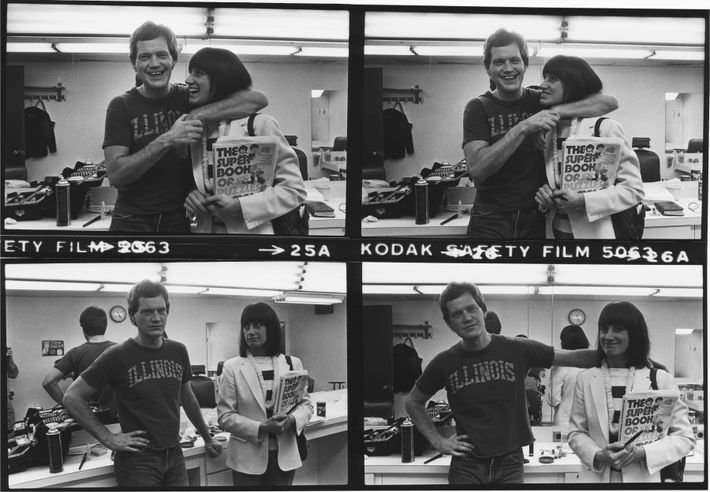
Late Night With David Letterman (NBC, 1982–1984)
Original staff: Andy Breckman (Monk); James Downey (Saturday Night Live); Chris Elliott (Get a Life); Sandy Frank (In Living Color); Tom Gammill and Max Pross (Seinfeld); Ted Greenberg, Rich Hall (Saturday Night Live); David Letterman (Late Show); Merrill Markoe (Newhart); Jeff Martin (The Simpsons); George Meyer (The Simpsons); Gerard Mulligan (Late Show); Steve O’Donnell (Jimmy Kimmel Live); Joe Toplyn (Monk); Matt Wickline (In Living Color), and David Yazbek (The Puzzle Place)
David Letterman’s Late Night forever changed the talk-show format and influenced every late-night host who followed, from Stewart to Kimmel to Conan, and that’s in no small part due to the diverse collection of comedic minds assembled here. Bringing in Chris Elliott, Rich Hall, Merrill Markoe, and Gerald Mulligan from his short-lived NBC morning show, Letterman turned the stuffy talk format on its head — both figuratively and literally (the show once did an “Upside Down Episode”). His original staff of writers would come to shape the most influential humor of the ’90s, including Seinfeld, The Simpsons, Saturday Night Live, and cult hit Get a Life. Worth singling out are Monk creator Andy Breckman; Saturday Night Live writer James Downey; Steve O’Donnell, who served as Late Night’s head writer for most of its run; George Meyer, an early Simpsons writer; Gerard Mulligan, Letterman’s longest-serving writer who stayed with him from 1980 to 2005, across three time slots, two networks, and three shows; and Merrill Markoe, Letterman’s first head writer who created many of the show’s regular segments (“Stupid Pet Tricks” included). The presence of a female head writer was a rarity in late night during this era, and sadly, still is today.
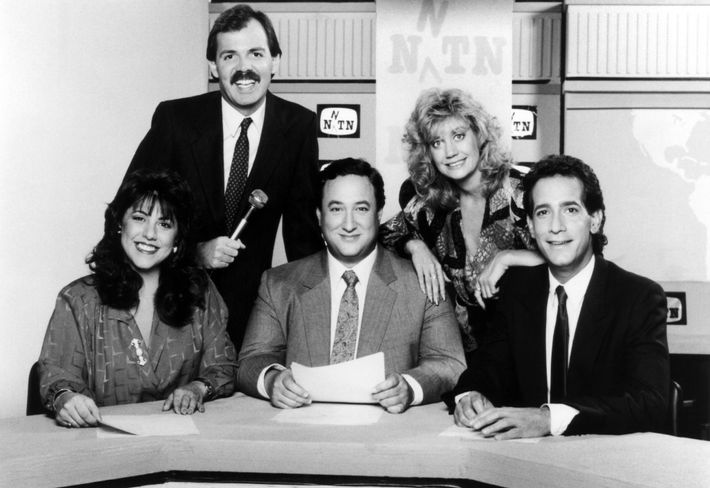
Not Necessarily the News (HBO, 1983–1990)
Season one staff: Larry Arnstein (Saturday Night Live); Rich Hall (Late Night With David Letterman); Sam Haam (Not Necessarily the News); David Hurwitz (Head of the Class); Al Jean (The Simpsons); Tom Kramer (50 Things to Do Before I Die); Mike Lupper (Not Necessarily the News); Ian Maxtone-Graham (Saturday Night Live); George Meyer (The Simpsons); John Moffitt (Mr. Show); Matt Neuman (Hollywood Squares); Conan O’Brien (Conan); Elaine Pope (Seinfeld); Mike Reiss (The Simpsons); Ron Richards (The Tonight Show With Jay Leno); and Jame Wendell (Not Necessarily the News)
Not Necessarily the News is a little known, largely forgotten, but highly influential sketch show that aired on HBO from 1983–1990. The season one roster of writers helped shape comedy over the next 20 years, including Elaine Pope who wrote three episodes of Seinfeld, including “The Cheever Letters,” as well as the screenplay for 2004 remake of Alfie, starring Jude Law; It’s Garry Shandling’s Show, The Simpsons, and The Critic writers Al Jean and Mike Reiss; and Ian Maxtone-Graham, who wrote for Saturday Night Live from 1992–1995. Everything came full circle, too, in the Simpsons episode “Homer Goes to College,” when Homer fills out an application essay and has to list his three favorite books. He answers, “Son of Sniglet,” referring to the Rich Hall–created, Not Necessarily the News–founded term that means “any word that doesn’t appear in the dictionary, but should.” Who wrote that episode? Conan O’Brien, whose first professional writing job was for Not Necessarily the News. Two years later, in 1985, Greg Daniels, who co-created King of the Hill and Parks and Recreation, joined the staff as well.
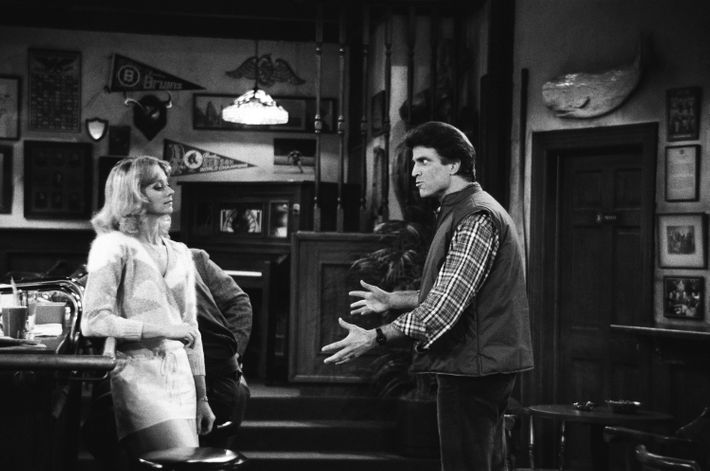
Cheers (NBC, 1982–1993)
Season three staff: David Angell, Peter Casey, and David Lee (Frasier); Glen and Les Charles (Taxi); Ken Estin (The Tortellis); David Isaacs and Ken Levine (Becker); David Lloyd (The Mary Tyler Moore Show); Jim Parker (Charles in Charge); Heide Perlman (The Bill Engvall Show); Tom Reeder (Night Court); Elliot Shoenman (Home Improvement); and Sam Simon (The Simpsons)
Season three of Cheers is when people other than critics began talking about the show (largely because of the casting addition of Kelsey Grammer as Dr. Frasier Crane), but right before it became one of the most popular sitcoms on TV. It finished No. 13 in the Nielsen ratings; a year later, Cheers would hit No. 5 and not drop out of the top ten for the rest of its 11-season run. The writing staff was relatively small, but what it lacked in size, it made up for in performance. Power trio David Angell, Peter Casey, and David Lee would later create Wings and, more importantly, Frasier, assisting Grammer with his eventual record of playing the longest-running sitcom character of all time. Elliot Shoenman wrote and produced many episodes of Home Improvement; while David Isaacs and Ken Levine created Almost Perfect and penned installments of The Simpsons, M*A*S*H, Everybody Loves Raymond, and Becker. After developing the show with Matt Groening and James L. Brooks, Sam Simon left The Simpsons after its fourth season but continues to receive an executive producer credit (he passed away in 2015); he also wrote for It’s Garry Shandling’s Show, The George Carlin Show (which he co-created), and The Drew Carey Show. David Lloyd was one of the most celebrated comedy writers of all time. He was Johnny Carson’s favorite monologue writer for The Tonight Show and would later pen episodes of The Mary Tyler Moore Show (including the legendary “Chuckles Bites the Dust”), Lou Grant, Taxi, Wings, and Frasier. Lloyd’s son, Modern Family co-creator Christopher Lloyd, dedicated an episode of his hit ABC sitcom to his dad, which ended with a phrase David wrote for “Chuckles”: “A little song, a little dance, a little seltzer down your pants.”
The New Show (NBC, 1984)
Staff: Valri Bromfield (The Rosie O’Donnell Show); Tom Davis (Saturday Night Live); Jim Downey (Saturday Night Live); Al Franken (Saturday Night Live); Tom Gammill (Seinfeld); Jack Handey (Saturday Night Live); Buck Henry (Get Smart); George Meyer (The Simpsons); Lorne Michaels (Saturday Night Live); Max Pross (Seinfeld); Dave Thomas (SCTV); and Alan Zweibel (Saturday Night Live)
Easily the least remarkable show on this list, The New Show still boasts an impressive roster of writers. The New Show was one of several projects that Lorne Michaels attempted to keep himself busy with during the hiatus he took from Saturday Night Live between 1980 and 1985, and the writing staff was a nice mix of scribes from Saturday Night Live’s golden age and the next generation of great comedy writers who would go on to revive the seminal sketch show following The New Show’s quick demise (it lasted all of nine episodes). The series featured members of Saturday Night Live’s original writing staff like Al Franken, Tom Davis, and Alan Zweibel, as well as future Saturday Night Live writers Jack Handey, George Meyer, Tom Gammill, and Max Pross. This newer crop of comedy writers would be the key to Saturday Night Live’s creative renaissance and go on to write for some of the best comedy shows of the ’80s and ’90s, including The Simpsons, Late Night With David Letterman, Seinfeld, and It’s Garry Shandling’s Show. The staff also included three performers who made up the central cast: Valri Bromfield, Dan Aykroyd’s former comedy partner and part of the original Second City Toronto cast; SCTV’s Dave Thomas; and prolific writer Buck Henry, who co-created Get Smart with Mel Brooks and co-wrote the screenplay to The Graduate, among many other extraordinary accomplishments.
It’s Garry Shandling’s Show (Showtime, 1986–1990)
Staff: Larry David (Seinfeld); Richard Day (Arrested Development); Jeff Franklin (Full House); Tom Gammill (Seinfeld); Al Jean (The Simpsons); Larry Levin (I Love You, Man); Monica Mcgowan Johnson (Laverne & Shirley); Max Pross (Seinfeld); Mike Reiss (The Critic); Garry Shandling (The Larry Sanders Show); Sam Simon (The Simpsons); Ed Solomon (Men in Black); and Alan Zweibel (Saturday Night Live)
Garry Shandling presided over a staggering group of comedic minds for the first series he starred in, It’s Garry Shandling’s Show. After creating the show with original Saturday Night Live staffer Alan Zweibel, the two hired several writers that would come to shape TV and film comedy over the next few decades. Al Jean, Mike Reiss, and Sam Simon all went on to become major parts of The Simpsons’ history during that show’s best years; while the writing team of Gammill and Pross, who were on staff for just about every good TV comedy during the ’80s and ’90s, and I Love You, Man writer Larry Levin would join the writing staff of Seinfeld, a series that was clearly influenced by Shandling’s show. Of course, it’s impossible to mention Seinfeld and It’s Garry Shandling’s Show in the same sentence without pointing out Larry David’s minor contributions to this series. David wrote one episode in 1987, using the pseudonym Mac Brandes for unknown reasons (presumably out of some sort of contractual issue, not because he was ashamed of his work here). Also on staff were Monica Mcgowan Johnson, who was Albert Brooks’s writing partner on his movies, and Richard Day, who went on to write for Arrested Development.
Roseanne (ABC, 1988–1997, 2018)
Seasons two and three staff: Jeff Abugov (Cheers); Tom Arnold (The Jackie Thomas Show); Geraldine Barr (Roseanne for President!); David A. Caplan (The Muppets); Maxine Epstein (Roseanne); Don Foster (Mike and Molly); Kim C. Friese (The Wonder Years); Bill Gerber (Roseanne); Bruce Graham (Anastasia); Sheree Guitar (Duet); Jennifer Heath (Dave’s World); Brad Isaacs (Newhart); Danny Jacobson (Mad About You); Allan Katz (Rhoda); Brian LaPan (Dinosaurs); Maxine Lapiduss (Ellen); Chuck Lorre (The Big Bang Theory); Joel Madison (The Fresh Prince of Bel-Air); Bob Myer (My Two Dads); Rebecca Parr (Cheers); Martin Pasko (Batman: The Animated Series); Steve Paymer (Mad About You); Mark Lloyd Rappaport (Renovation Nation); Amy Sherman (Gilmore Girls); Penelope Spheeris (The Little Rascals); Norma Safford Vela (Designing Women); and Joss Whedon (Buffy the Vampire Slayer)
A few years ago, before the current (and politically polarizing) revival, Roseanne Barr wrote an article for New York Magazine discussing how much of a struggle it was for her, as a woman, to make it in Hollywood and how not much has changed today. It’s a fascinating portrait of the early seasons of ABC’s Roseanne, including her problems with producer Matt Williams, who originally listed himself as the creator of the program (Barr didn’t realize until the first episode aired on TV). After the show’s hit first season, which Barr now says is “god-awful,” Williams left to create Home Improvement with Tim Allen, and Barr began to weed out the writers who found “stinky-pussy jokes” funny. She then, in her words, “hired comics that I had worked with in clubs, rather than script writers. I promoted several of the female assistants — who had done all the work of assembling the scripts anyway — to full writers. I gave Joss Whedon and Judd Apatow their first writing jobs, as well as many other untried writers who went on to great success,” such as Gilmore Girls creator Amy Sherman-Palladino.
The Simpsons (Fox, 1989–Present)
Seasons four and five staff: Gary Apple (The Sinbad Show); Bill Canterbury (Star Wars: The Clone Wars); Michael Carrington (Martin); Greg Daniels (Parks and Recreation); Al Jean (The Critic); Jay Kogen (Frasier); Adam I. Lapidus (Full House); Jeff Martin (Late Night With David Letterman); Dan McGrath (King of the Hill); George Meyer (Late Night With David Letterman); David Mirkin (Newhart); Frank Mula (The Martin Short Show); Bill Oakley (Mission Hill); Conan O’Brien (Late Night With Conan O’Brien); Mike Reiss (The Critic); David Richardson (Malcolm in the Middle); Jace Richdale (The Oblongs); Sam Simon (Cheers); David M. Stern (The Wonder Years); John Swartzwelder (Saturday Night Live); Jon Vitti (The Larry Sanders Show); Josh Weinstein (Futurama); and Wallace Wolodarsky (The Polka King)
Just like when Mr. Burns hired Don “Sideburns” Mattingly, Darryl Strawberry, and a team of ringers to beat Shelbyville Nuclear Power Plant in a game of softball, Sam Simon picked a bunch of all-stars to pen the early episodes of The Simpsons. The original staff was made up of John Swartzwelder, Jon Vitti, George Meyer, Jeff Martin, Al Jean, Mike Reiss, Jay Kogen, and Wallace Wolodarsky, but we included everyone who wrote an episode in the show’s exceptionally stellar fourth and fifth seasons. With the possible exception of Your Show of Shows, the Simpsons’ writing staff is probably the most famous and adored in the history of television, led by Conan O’Brien (who wrote “Marge vs. the Monorail” and “Homer Goes to College”) and Greg Daniels, the co-creator of King of the Hill and Parks and Recreation. Whether it’s reading the infamous New Yorker profile on George Meyer for the 13th time or wondering what the reclusive Swartzwelder is up to (and looks like) today, comedy fans hold the Simpsons writing staff in the same esteem as baseball fans do the 1927 Yankees (although I, for one, would choose the radiation-poisoned Mike Scioscia over Earle Combs any day).
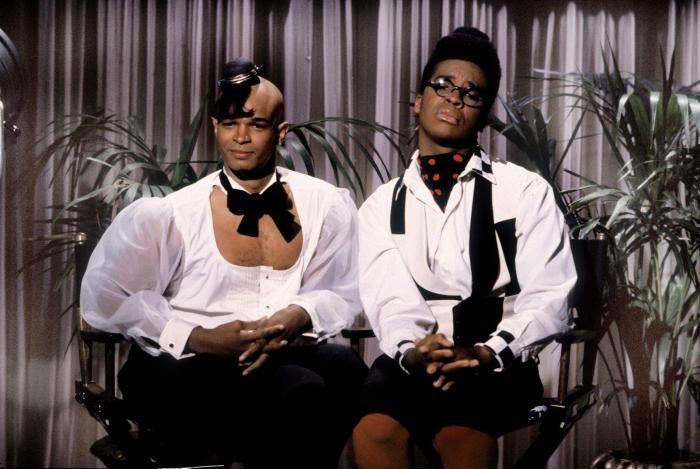
In Living Color (Fox, 1990–1994)
Season three staff: Franklyn Ajaye (Politically Incorrect); Fax Bahr (MADtv); Kim Bass (Kenan & Kel); John Bowman (Martin); Jim Carrey (Ace Ventura); Jeanette Collins (Suddenly Susan); Barry Douglas (City Guys); Harry Dunn (The Pretender); Greg Fields (The Parent ‘Hood); Les Firestein (Wanda at Large); Sandy Frank (The Jamie Foxx Show); Mimi Friedman (Suddenly Susan); Fred Graver (Best Week Ever); Becky Hartman Edwards (The Larry Sanders Show); Ron Hauge (The Simpsons); Michelle Jones (Out All Night); Paul Mooney (Chappelle’s Show); J.J. Paulsen (Cosby); Charlie Rubin (The Jon Stewart Show); Buddy Sheffield (Roundhouse); Adam Small (MADtv); Michael Anthony Snowden (South Park); Warren Thomas (Premium Blend); Steve Tompkins (The PJs); Joe Toplyn (Monk); Pam Veasey (CSI: NY); Damon Wayans (My Wife and Kids); Keenen Ivory Wayans (The Keenen Ivory Wayans Show); Matt Wickline (The Hughleys); Larry Wilmore (The Bernie Mac Show); and Marc Wilmore (The Simpsons)
Jim Carrey is the big name here, but Fire Marshall Bill only contributed “special material” to In Living Color’s underrated, excellent third season. It’s the rest of the huge writing staff, including creator Keenen Ivory Wayans, who did much of the behind-the-scenes grunt work, and their efforts would be rewarded in the following years — many of the names listed above went on to create shows of their own. Fax Bahr, Adam Small, John Bowman, Matt Wickline, Damon Wayans, and Larry Wilmore alone created Gary & Mike, The Jamie Kennedy Experiment, Blue Collar TV, MADtv, The Show, Martin, Cedric the Entertainer Presents, Frank TV, The Hughleys, 413 Hope St., Damon, My Wife and Kids, The Underground, Rodney, The PJs, The Bernie Mac Show, and Insecure; while Kim Bass gave us Sister, Sister, and Kenan & Kel and Fred Graver chipped in with Best Week Ever (he also wrote for Cheers). Elsewhere, Les Firestein, one of In Living Color’s head writers, co-created Wanda at Large; Paul Mooney wrote and starred in one of the Chappelle’s Show greatest skits, “Negrodamus”; and Ron Hague penned episodes of The Simpsons, Rocko’s Modern Life, and Seinfeld, including “The Marine Biologist.” And we’ve only just scratched the surface. If you laughed at a show in the past decade, it’s likely someone from In Living Color wrote for or produced it at some point.
The Ben Stiller Show (Fox, 1992–1993)
Staff: Judd Apatow (Freaks and Geeks); Robert Cohen (The Simpsons); David Cross (Mr. Show); Brent Forrester (The Simpsons); Jeff Kahn (Drawn Together); Bob Odenkirk (Mr. Show); Bruce Kirschbaum (Seinfeld); Sultan Pepper (MADtv); Dino Stamatopoulos (Community); and Ben Stiller (Zoolander)
The Ben Stiller Show, the winner of the 1993 Emmy for Outstanding Writing in a Variety or Music Program, boasted a capital-A Amazing group of writers. It was among the first TV series writing credits for Judd Apatow, David Cross, Brent Forrester, and Dino Stamatopoulos, and it was also where Cross and Bob Odenkirk met, leading to Mr. Show two years later.
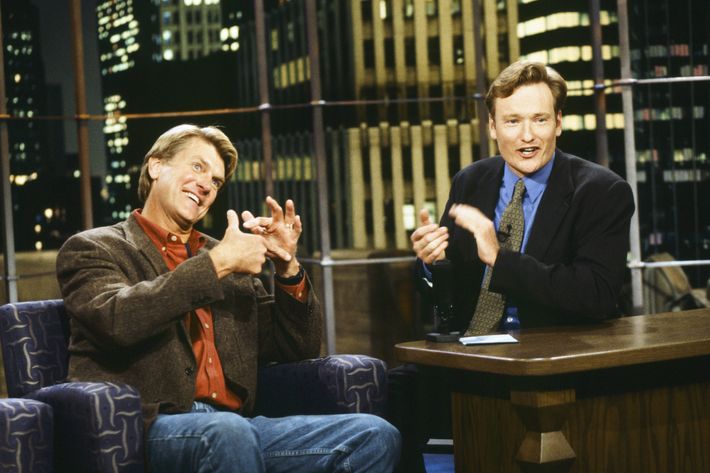
Late Night With Conan O’Brien (NBC, 1993–2009)
Original staff: Tom Agna (The Chris Rock Show); Tommy Blacha (Metalocalypse); Louis C.K. (Louie); Michael Gordon (Conan); Marsh McCall (Just Shoot Me!); Conan O’Brien (Conan); Bob Odenkirk (Mr. Show); David Reynolds (Finding Nemo); Andy Richter (Andy Richter Controls the Universe); Robert Smigel (Saturday Night Live); and Dino Stamatopoulos (Community)
If there was a fantasy-football-style draft for writers rooms, the No. 1 pick in the Comedy Draft might be the staff of Late Night With Conan O’Brien, circa 1993–1994. Because, with the benefit of hindsight, we know: Tom Agna would win an Emmy for his work on The Chris Rock Show; Tommy Blacha, Louis C.K., Bob Odenkirk, Andy Richter, and Dino Stamatopoulos would create Metalocalypse, Louie, Mr. Show, Andy Richter Controls the Universe, and Moral Orel and be nominated for a ton of Emmys; Robert Smigel’s “TV Funhouse” shorts would become a highlight of Saturday Night Live for years to come; and David Reynolds would co-write the screenplay for Finding Nemo and The Emperor’s New Groove. Not too shabby.
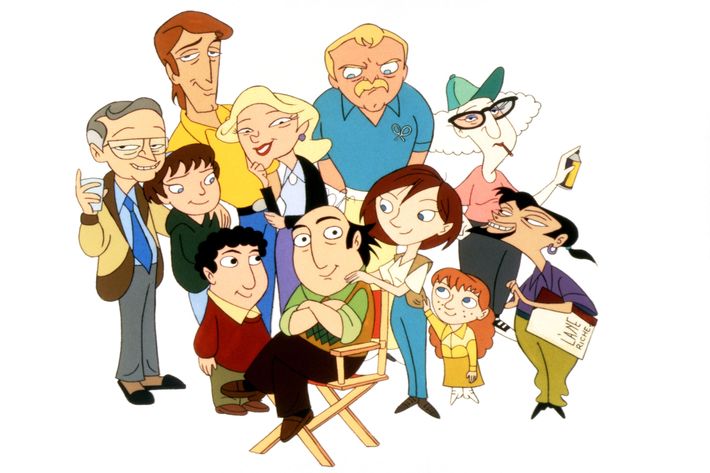
The Critic (Fox, 1994–1995)
Season one staff: Judd Apatow (Freaks and Geeks); Tom Brady (Good Vibes); Tom Gammill (Seinfeld); Al Jean (The Simpsons); Ken Keeler (Futurama); Steven Levitan (Modern Family); Max Pross (Seinfeld); Mike Reiss (The Simpsons); Nell Scovell (Sabrina, the Teenage Witch); Steve Tompkins (The Ranch); Patric M. Verrone (Futurama); and Jon Vitti (King of the Hill)
Mike Reiss and Al Jean, the creators of The Critic, met while students at Harvard University and worked together on The Tonight Show With Johnny Carson and It’s Garry Shandling’s Show. They were the first members of the original Simpsons writing staff and eventually became dual showrunners for the show’s third and fourth seasons, cementing their spot in the Comedy Hall of Fame. They left The Simpsons in 1993 to work on The Critic and hired Tom Gammill and Max Pross (both of whom would later become executive producers of The Simpsons); Steven Levitan (creator of Just Shoot Me! and Modern Family); Nell Scovell (creator of Sabrina, the Teenage Witch); Tom Brady (writer and director of The Hot Chick); Steve Tompkins (writer for The Ranch); Jon Vitti (the second most prolific writer in Simpsons history, penning such classics as “Cape Feare”); Ken Keeler (who wrote arguably the best episode of Futurama, “The Devil’s Hands Are Idle Playthings”); and Patric M. Verrone (former Johnny Carson writer). Also, this Judd Apatow guy. You might have heard of him.
The Day Today (BBC 2, 1994)
Staff: Peter Baynham (Borat); Steve Coogan (I’m Alan Partridge); Rebecca Front (Knowing Me, Knowing You with Alan Partridge); Armando Iannucci (The Thick of It); Graham Linehan (The IT Crowd); Doon Mackichan (Smack the Pony); Patrick Marber (Closer); Arthur Matthews (Father Ted); Christopher Morris (Four Lions); and David Schneider (Uncle Max)
A satirical show from the U.K. that came to shape British comedy in the years that followed, The Day Today was a miraculous confluence of comedic talent, especially in the writers room. The show, an adaptation of the radio program On the Hour, picked up where that series left off and kept most of its writing staff, with the exception of the team of Stewart Lee and Richard Herring. The Day Today marked the television debut of Steve Coogan’s character Alan Partridge, who was a major influence on another sitcom anti-hero, David Brent (played by Ricky Gervais on The Office). Writers Rebecca Front, Armando Iannucci, Patrick Marber, and David Schneider went to work with Coogan on the subsequent Alan Partridge series Knowing Me, Knowing You; while Arthur Matthews, Graham Linehan, and Peter Baynham followed Christopher Morris to Brass Eye, a show that expounded on the work Morris did on The Day Today and greatly influenced Sacha Baron Cohen. Iannucci has also drawn acclaim for The Thick of It (and its subsequent movie, In the Loop), Veep, and The Death of Stalin; while Christopher Morris’s terrorism comedy Four Lions made waves. Patrick Marber proved to be an unexpectedly strong dramatic writer with his play Closer (he also wrote the screenplay for the film adaptation). Schneider’s show Uncle Max has proven popular with children and families; while Graham Linehan created Father Ted with writing partner Arthur Matthews and Black Books and The IT Crowd without him.
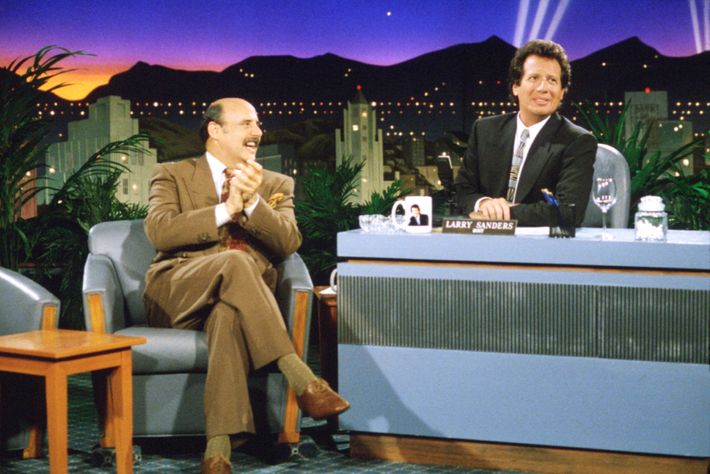
The Larry Sanders Show (HBO, 1992–1998)
Season three staff: Judd Apatow (Freaks and Geeks); Maya Forbes (Monsters vs Aliens); Mike Martineau (Rescue Me); John Riggi (30 Rock); Drake Sather (Zoolander); Garry Shandling (It’s Garry Shandling’s Show); Paul Simms (NewsRadio); and Peter Tolan (Rescue Me)
After presiding over an excellent writers room for It’s Garry Shandling’s Show in the late ’80s, Garry Shandling assembled another comedic dream team for his second series. Shandling served as showrunner with Peter Tolan throughout all six years of the show, but the season three staff is one of the best groups of scribes they ever had. Shandling mentored writers like Peter Tolan, best known outside Sanders for his collaborations with Denis Leary (Rescue Me, The Job) and Harold Ramis (Analyze This, Bedazzled); Judd Apatow, who was coming off the implosion of The Ben Stiller Show at the time, but now ranks among the most powerful figures in the comedy world; Paul Simms, who created NewsRadio and has written for Flight of the Conchords, Girls, and Divorce; longtime 30 Rock producer-writer John Riggi; and Drake Sather, who tragically passed away in 2004 but was responsible for a lot of great comedy while he was here, including serving as a writer-producer on NewsRadio and creating the character Derek Zoolander with Ben Stiller in the ’90s and co-scripting the movie with him years later.
Mr. Show (HBO, 1995–1998)
Staff: Scott Aukerman (Comedy Bang Bang); David Cross (Arrested Development); Brent Forrester (The Simpsons); Eric Hoffman (W/ Bob and David); Jay Johnston (Moral Orel); Bill Odenkirk (The Simpsons); Bob Odenkirk (Tenacious D); B.J. Porter (Between Two Ferns Wwith Zach Galifianakis); Brian Posehn (The Man Show); Dino Stamatopoulos (Community); Paul F. Tompkins (W/ Bob and David); and Mike Upchurch (The Chris Rock Show)
It goes without saying that Mr. Show holds an almost mythic place in the hearts and minds of comedy nerds, and the caliber of the show’s writers plays no small part in its greatness. David Cross and Bob Odenkirk pulled a lot of talent from L.A.’s alternative comedy scene to fill their writers room and started a lot of amazing careers in the process. Since Mr. Show, Brian Posehn has seen his stand-up career blossom; he also served three years in the cast of The Sarah Silverman Program, along with fellow Mr. Show writer Jay Johnston. Dino Stamatopoulos, now most recognizable as Star-Burns on Community, created the Adult Swim stop-motion comedies Moral Orel and Mary Shelley’s Frankenhole. Bill Odenkirk and occasional Mr. Show contributor Brent Forrester went on to write for The Simpsons. Scott Aukerman and B.J. Porter created the long-running weekly live comedy show Comedy Death-Ray (now called Comedy Bang Bang); and Aukerman hosts the equally popular podcast of the same name, which was turned into an IFC series that lasted five seasons. Paul F. Tompkins has his own beloved podcast in Spontaneanation and has probably appeared on your favorite podcast, too.
The Dana Carvey Show (ABC, 1996)
Staff: Louis C.K. (Louie); Steve Carell (The Office); Robert Carlock (30 Rock); Dana Carvey (Saturday Night Live); Bill Chott (Saturday Night Live); Stephen Colbert (The Late Show With Stephen Colbert); Jon Glaser (Delocated); Charlie Kaufman (Eternal Sunshine of the Spotless Mind); Heather Morgan (The Comeback); Robert Smigel (TV Funhouse); Dino Stamatopoulos (Community); and Michael Stoyanov (Mr. Show)
Oddly, it’s the show’s namesake who’s had the weakest career since the mid-’90s. Within the writing staff of The Dana Carvey Show there’s Charlie Kaufman, the writer of one of the finest movies of the 2000s (Eternal Sunshine of the Spotless Mind); one of the most world’s popular stand-up comedians until a sexual-harassment scandal torpedoed his career (Louis C.K.); an Emmy and Grammy winner (Stephen Colbert); a five-time Emmy nominee and the creator of Delocated (Jon Glaser); the co-showrunner of 30 Rock and co-creator of Unbreakable Kimmy Schmidt (Robert Carlock); a Mr. Show writer and Billions star (Michael Stoyanov); the brain behind the Ambiguously Gay Duo (Robert Smigel); and Michael Scott (Steve Carell). It’s mind-boggling that the show, every episode of which was named after an advertiser sponsor (episode four: “The Diet Mug Root Beer Dana Carvey Show”), aired for less than two months.
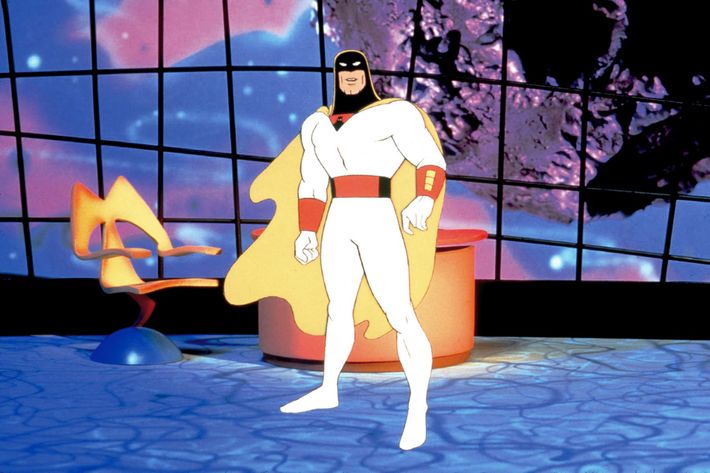
Space Ghost Coast to Coast (Cartoon Network, 1994–1999, 2001–2004, 2006–2008)
Season four staff: Mark Banker (Adventure Time); Michael Cahill (Space Ghost Coast to Coast); Rich Dahm (The Colbert Report); Evan Dorkin and Sarah Dyer (Milk and Cheese comics series); Chip Duffey (Space Ghost Coast to Coast); Matt Harrigan (FishCenter Live); Randolph Heard (The Tick); Ben Karlin (Future Man); Michael Lazzo (Robot Chicken); Sean LeFleur (TV Funhouse); Matt Maiellaro (Aqua Teen Hunger Force); Andy Merrill (The Brak Show); Michael Ouweleen (Harvey Birdman, Attorney at Law); Adam Reed (Archer); Erik Richter (Harvey Birdman, Attorney at Law); Pete Smith (The Brak Show); Matt Thompson (Frisky Dingo); Dan Vebber (Futurama); and Dave Willis (Squidbillies)
Many members of the Space Ghost Coast to Coast writing staff have been behind some of the most offbeat, hilarious comedy series in recent memory. Williams Street head Michael Lazzo created Space Ghost and has since produced The Powerpuff Girls, Harvey Birdman, The Venture Bros., Robot Chicken, Aqua Teen Hunger Force, and Squidbillies (and said some indefensible things about Adult Swim’s unfortunate lack of female creators), while Matt Harrigan and Adam Reed have gone on to create Celebrity Deathmatch and Sealab 2021, Frisky Dingo, and Archer.
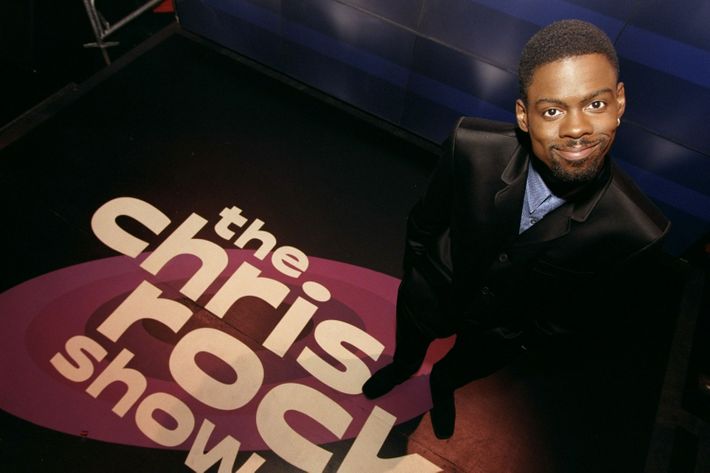
The Chris Rock Show (HBO, 1997–2000)
Season two staff: Tom Agna (Late Night With Conan O’Brien); Louis C.K. (Louie); Vernon Chatman (Wonder Showzen); Lance Crouther (Lopez Tonight); Gregory Greenberg (Dennis Miller Live); Ali LeRoi (Everybody Hates Chris); Steve O’Donnell (Jimmy Kimmel Live); Chris Rock (Everybody Hates Chris); Frank Sebastiano (Saturday Night Live); Chuck Sklar (The Late Late Show With James Corden); Jeff Stilson (The Last O.G.); Wanda Sykes (The Wanda Sykes Show); and Mike Upchurch (Mr. Show)
Chris Rock’s Emmy-winning late-night comedy show boasted a writing staff made up of some of the biggest names in comedy today, including Rock himself, Louis C.K., and Wanda Sykes. But The Chris Rock Show’s talent pool goes even deeper. Ali LeRoi co-created Are We There Yet? and Everybody Hates Chris with Rock, in addition to scripting Rock’s movies, Down to Earth and Head of State. Steve O’Donnell was an original writer for David Letterman who later served as a head writer to David Letterman and Jimmy Kimmel. Jeff Stilson has worked for The Daily Show, Da Ali G Show, and The Last O.G. Frank Sebastiano wrote for Saturday Night Live during the show’s Will Ferrell–led creative renaissance; while Vernon Chatman (the voice of Towelie on South Park) and John Lee created Wonder Showzen, Xavier: Renegade Angel, and The Heart, She Holler.
Scrubs (NBC/ABC, 2001–2010)
Season three staff: Gabrielle Allan (Veep); Janae Bakken (Baby Daddy); Garrett Donovan and Neil Goldman (Superior Donuts); Rich Eustis (Head of the Class); Debra Fordham (Nashville); Tim Hobert (The Middle); Bill Lawrence (Cougar Town); Angela Nissel (The Boondocks); Mike Schwartz (Bored to Death); Justin Spitzer (Superstore); Mark Stegemann (Raising Hope); Matt Tarses (Alex, Inc.); and Eric Weinberg (Death Valley)
Despite being a dependably funny sitcom for the majority of its nine-season run, Scrubs was only nominated for a single writing Emmy: season three’s “My Screw Up,” written by the team of Neil Goldman and Garrett Donovan, who also lent their comedy chops to Community (the characters Fat Neil and Garrett are named after them) and the short-lived Superior Donuts. Justin Spitzer wrote numerous episodes of The Office before moving on to his own acclaimed NBC workplace comedy, Superstore. Speaking of critically approved sitcoms: Scrubs creator Bill Lawrence went from Sacred Heart to Cougar Town; while Angela Nissel, Tim Hobert, and Mark Stegemann worked on The Boondocks, The Middle, and Preacher, respectively.
Arrested Development (Fox/Netflix, 2003–2006, 2013–current)
Season two staff: Barbie Adler (How I Met Your Mother); Brad Copeland (The Inbetweeners); Abraham Higginbotham (Modern Family); Mitchell Hurwitz (Lady Dynamite); John Levenstein (Kroll Show); Courtney Lilly (Black-ish); Chuck Martin (Shrink); Lisa Parsons (It’s Always Sunny in Philadelphia); Richard Rosenstock (The Big Bang Theory); and Jim Vallely (Running Wilde)
“I have Pop-Pop in the attic.” “I’m afraid I just blue myself.” “I just want my kids back!” Arrested Development was never more quotable than in season two, thanks to the work of talented writers like Kroll Show co-creator John Levenstein; Abraham Higginbotham, who has penned episodes of Modern Family, Ugly Betty, and Will and Grace; Black-ish producer Courtney Lilly; and of course, creator Mitchell Hurwitz. The good: Arrested is back on Netflix for its fifth season; the bad: the Maria Bamford–starring Lady Dynamite, which Hurwitz created with Pam Brady, was axed by the streaming service. At least he’s used to premature cancellations.
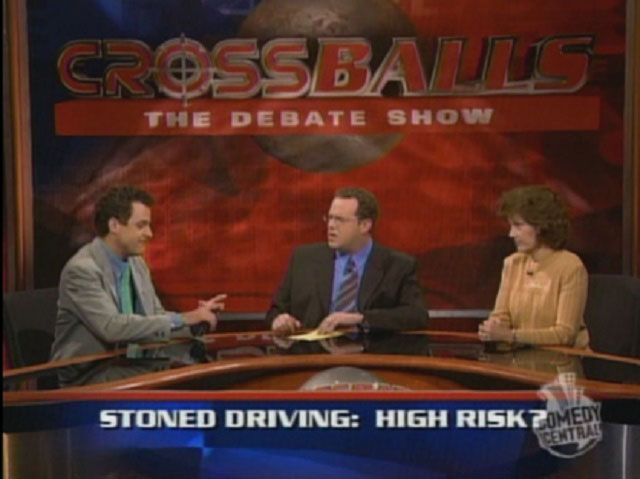
Crossballs: The Debate Show (Comedy Central, 2004)
Staff: Matt Besser (The UCB Show); Mary Birdsong (Reno 911!); Aaron Blitzstein (Family Guy); Chad Carter (The Detour); Andy Daly (Review); Dannah Feinglass (The Hotwives of Orlando); Chris Gethard (The Chris Gethard Show); Brian Huskey (Kroll Show); Laura Krafft (Another Period); Dylan Morgan & Josh Siegal (30 Rock); Seth Morris (The Eric Andre Show); Jerry Minor (Mr. Show); Joe O’Brien (Late Late Show With Craig Ferguson); Paul Scheer (Human Giant); and Charlie Siskel (Review)
A parody of basic-cable political debate shows like CNN’s Crossfire and MSNBC’s Hardball, Crossballs, created by Matt Besser and Charlie Siskel, satirized these shouting matches by bringing in comedians playing characters to argue with real experts who aren’t in on the joke. The series was quickly canceled after eight weeks, but Besser and Siskel put together a writing staff composed of comedians that would come to dominate the humor field in the years that followed, many of them coming from Besser’s own UCB Theatre. Podcast all-star Paul Scheer went on to create Human Giant and NTSF:SD:SUV:: (not to mention starring in The Disaster Artist); Seth Morris’s sad-sack character Bob Ducca swept the podcast world; Chris Gethard created and stars in his own off-the-wall public-access turned truTV talk show; and Andy Daly has become a dependable and frequently used character actor, popping up in wildly divergent projects like Silicon Valley and Adventure Time, while also creating his own five-star series, Review. It’s a shame that Crossballs was axed, given all of the mayhem and lunacy this group was responsible for, but its “gotcha!” premise meant that potential guests would have caught on to the joke sooner or later.
The Office (NBC, 2005–2013)
Season four staff: Steve Carell (Angie Tribeca); Jennifer Celotta (Home Improvement); Greg Daniels (Parks and Recreation); Lee Eisenberg and Gene Stupnitsky (Hello Ladies); Brent Forrester (Love); Mindy Kaling (The Mindy Project); Lester Lewis (Partners); Paul Lieberstein (Song of Back and Neck); B.J. Novak (The Mindy Project); Michael Schur (The Good Place); and Justin Spitzer (Superstore)
Steve Carell only wrote two episodes of The Office: “Casino Night” and “Survivor Man.” In other words, Michael Scott would boast that he had a perfect batting average, not that the rest of the season four staff didn’t put up MVP numbers, too, in Scranton and elsewhere. Greg Daniels is the co-creator of Parks and Recreation and King of the Hill; while Lee Eisenberg and Gene Stupnitsky chipped in with Hello Ladies, and Justin Spitzer with Superstore. We’d be remiss to not mention the other onscreen talent, too, including Mindy Kaling’s The Mindy Project, B.J. Novak’s roles in Inglourious Basterds and Crazy Ex-Girlfriend, and Michael Schur’s top-tier comedy universe of Parks and Recreation, Brooklyn Nine-Nine, and The Good Place. Also, Toby.
30 Rock (NBC, 2006–2013)
Season three staff: Jack Burditt (The Mindy Project); Kay Cannon (Girlboss); Robert Carlock (Unbreakable Kimmy Schmidt); Tom Ceraulo (30 Rock); Tina Fey (Unbreakable Kimmy Schmidt); Donald Glover (Atlanta); Matt Hubbard (Superstore); Jon Pollack (Perfect Couples); John Riggi (The Comeback); Tami Sagher (Inside Amy Schumer); Ron Weiner (Silicon Valley); and Tracey Wigfield (Great News)
Season three of 30 Rock was nominated for 22 Emmy Awards, breaking a single-season record for a sitcom set by … season two of 30 Rock. Each and every one was well deserved, too, especially the remarkable four Outstanding Writing for a Comedy Series nominations: two for Robert Carlock (one with Modern Family and Great News writer Jack Burditt), who would go on to create the equally hilarious Unbreakable Kimmy Schmidt with Tina Fey; one for Silicon Valley writer Ron Weiner; and another for eventual winner Matt Hubbard, who’s currently working on a still-untitled series starring Fred Armisen and Maya Rudolph. The rest of the staff didn’t get nominated for this season — some had to wait until season four, like Kay Cannon (of Pitch Perfect and Blockers fame), or season seven, like Great News creator Tracey Wigfield, or for another series, like Atlanta creator/Solo star/musician/everything Donald Glover.
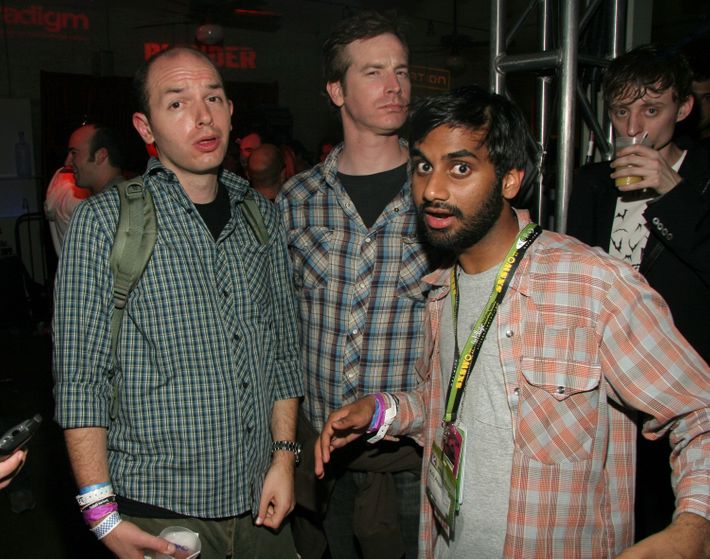
Human Giant (MTV, 2007–2008)
Season two staff: Aziz Ansari (Master of None); Tom Gianas (Saturday Night Live); Rob Huebel (Do You Want to See a Dead Body?); Paul Scheer (NTSF:SD:SUV::); and Jason Woliner (Eagleheart)
Consultant writers: Leo Allen (Saturday Night Live); Eric Appel (The Andy Milonakis Show); H. Jon Benjamin (Jon Benjamin Has a Van); Andy Blitz (Review); Chad Carter (Crossballs); Jon Glaser (Delocated); Jay Johnston (Mr. Show); Dan Mintz (Nathan for You); Morgan Murphy (Late Night With Jimmy Fallon); Patton Oswalt (The Comedians of Comedy); Brian Posehn (Mr. Show); Ian Roberts (Upright Citizens Brigade); and Meredith Scardino (Unbreakable Kimmy Schmidt)
The sketch group Human Giant didn’t have a full writing staff during its run, with its members Aziz Ansari, Rob Huebel, Jason Woliner (the often-overlooked nonacting member), and Paul Scheer being the show’s only full-time writers, along with TV veteran Tom Gianas, who served as showrunner. What’s unique about the way Human Giant was written, though, is that they hired some of the most respected names in comedy, many of them from Conan and Mr. Show, as consultants. These comedy giants, including Review creator Andy Daly, stand-up legend Patton Oswalt, and Unbreakable Kimmy Schmidt writer Meredith Scardino, came in to kick around ideas and punch up sketches, their assistance being part of the reason Human Giant was such an outstanding sketch show.
Community (NBC, 2009–2015)
Season three staff: Maggie Bandur (The Michael J. Fox Show); Steve Basilone (The Goldbergs); Andy Bobrow (The Last Man on Earth); Alex Cooley (Welcome to the Family); Adam Countee (Vice Principals); Alex Cuthbertson (New Girl); Garrett Donovan and Neil Goldman (Superior Donuts); Matt Fusfeld (Ben and Kate); Megan Ganz (Modern Family); Dan Harmon (Rick and Morty); Chris Kula (Wrecked); Chris McKenna (American Dad!); Annie Mebane (The Goldbergs); Matt Murray (Brooklyn Nine-Nine); Tim Saccardo (American Dad!); Vera Santamaria (BoJack Horseman); and Matt Warburton (The Simpsons)
By the end of season three, Community was halfway to its #SixSeasonsAndAMovie goal. We’re still waiting for that movie, but until then, we can rewatch “Remedial Chaos Theory” (written by Chris McKenna, who also penned the brilliant American Dad! holiday episode “Rapture’s Delight”); “Geography of Global Conflict” (The Last Man on Earth’s Andy Bobrow); “Documentary Filmmaking: Redux” (Modern Family and It’s Always Sunny in Philadelphia’s Megan Ganz); “Urban Matrimony and the Sandwich Arts” (BoJack Horseman’s Vera Santamaria); “Regional Holiday Music” (The Goldbergs’ Stephen Basilone and Brockmire’s Annie Mebane); and “Horror Fiction in Seven Spooky Steps” (creator Dan Harmon, who’s also the co-genius behind Rick and Morty). That’s a lot of talented Human Beings.
Parks and Recreation (NBC, 2009–2015)
Season four staff: Katie Dippold (MADtv); Dan Goor (Brooklyn Nine-Nine); Norm Hiscock (The Kids in the Hall); Dave King (The League); Aisha Muharrar (The Good Place); Nick Offerman (Axe Cop); Chelsea Peretti (Kroll Show); Amy Poehler (The UCB Show); Michael Schur (The Good Place); Mike Scully (The Simpsons); Harris Wittels (The Sarah Silverman Program); and Alan Yang (Master of None)
Michael Schur is a comedy legend not only for creating Parks and Recreation, but also Brooklyn Nine-Nine and The Good Place (as well as writing for The Office during the show’s best years). On Parks, he brought in talented writer after talented writer, including the late Harris Wittels (whom Amy Poehler called the “funniest person I ever met,” which if you’ve heard his Foam Corner segment on Comedy Bang Bang, yes); Kroll Show and Brooklyn Nine-Nine standout Chelsea Peretti; Aisha Muharrar, who would later write for The Good Place; Simpsons showrunner Mike Scully; Brooklyn Nine-Nine co-creator Dan Goor; Master of None co-creator Alan Yang; and The Heat and Ghostbusters screenwriter Katie Dippold, among others. (The others include Poehler and Nick Offerman, but as the stars of the show, they’re already earning the big bucks; they don’t need the recognition for their writing, too.)
Key & Peele (Comedy Central, 2012–2015)
Season five staff: Rebecca Drysdale (High Maintenance); Colton Dunn (The Eric Andre Show); Phil Augusta Jackson (Brooklyn Nine-Nine); Keegan-Michael Key (MADtv); Jay Martel (Teachers); Jordan Peele (MADtv); Ian Roberts (The UCB Show); Alex Rubens (Rick and Morty); Charlie Sanders (Do You Want to See a Dead Body?); and Rich Talarico (Review)
Four words: “Oscar winner Jordan Peele.” His counterpart isn’t doing too shabby, either: Keegan-Michael Key, who showed off his romantic-comedy chops in Playing House, will star in Shane Black’s The Predator (the pair will also lend their voices to Henry Selick’s next stop-motion movie, Wendell and Wild). Meanwhile, Colton Dunn has a lead role in Superstore; Rebecca Drysdale has written for High Maintenance and Baskets; and Jay Martel, an executive producer on Teachers, penned one of the most honest essays you’ll ever read about what it’s like to say good-bye to a show. “Key & Peele gave me a chance to play out the dynamics of my dysfunctional childhood with an audience of millions,” he wrote in The New Yorker. “And, for five years, everything was fine.” I bet most of the writers on this list would agree.
Bradford Evans contributed to the original version of this article in 2011.


